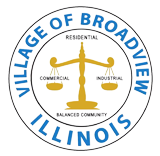The Village of Broadview hears a wide range of cases involving violations of municipal ordinances that were once heard in the Cook County Circuit Court. Hearings at the Village Hall expedite resolutions, reduce litigation expenses, and are more convenient for residents and visitors who wish to contest a ticket or other citation. The information on this page is an explanation of the procedures one can expect.
An administrative hearing is a civil not a criminal proceeding. Cases are punishable by fines and a variety of other penalties not including jail time. Under the administrative hearing system, an Administrative Law Judge, not the Village entity that issued the ticket, complaint or notice of violation, hears cases. Law Judges, all of whom are experience attorneys, are required to undergo state-mandated training to be professional, fair, and courteous. The Village of Broadview hears, or may hear in the future, the following types of cases:
- Fire Code Violations
- Unlawful solicitation practices
- Unlicensed businesses
- Overflowing garbage dumpsters
- Unsanitary food businesses
- Zoning violations
- Compliance tickets
- Unregistered animal violations
- Vegetation overgrowth
- Lead paint in buildings with minors
Administrative Hearings Procedure
A Village inspector or village code enforcer may issue a ticket or notice of violation, or file a complaint against an individual. A case also may be initiated following a citizen or community complaint. If you receive a citation, a complaint or notice of violation ordering you to appear at a hearing before the Village of Broadview Administrative Law Judge, you or your representative must be present on the date and time specified. If English is not your first language, you must bring someone to assist you.
Who Must Appear
The individual contesting charges may represent him or herself, hire an attorney to represent you at your own expense, or in some instances, have an authorized representative attend the hearing on your own behalf. Your representative may be an employee or agent.
A continuance is not allowed unless the Administrative Law Judge finds a good cause. If you or your representative fail to appear for a scheduled hearing you are in default, and may be found liable in your absence. You will be then be subject to any and all fines and penalties.
If you are in default on a matter, you have 21 days to request a new hearing. To request a new hearing, you must file a Motion To Set Aside Default. The form is available at the Village of Broadview Building Department. The form must be filed in person between 8:30 a.m. and 4:30 p.m., Monday through Friday, at the Village of Broadview Building Department, 2350 S. 25th Avenue. At the time of filing your request, you will be scheduled for a hearing. You will automatically receive a hearing date indicating when you MUST appear if you wish to challenge the default judgment. At the hearing, the Administrative Law Judge will rule on your request. If your request is granted, you will be expected to proceed with your hearing immediately after the ruling.
Attending the Hearing
Hearings are conducted in the Council Chambers at Village Hall, 2350 S. 25th Avenue. All hearings start promptly at the time indicated on the notice. It is recommended that you arrive in the hearing room a few minutes early. Once you enter the hearing room, please sign in and sit down until your case is called.
Cell phone usage, audio and video equipment, newspapers, magazines, food, drink, and chewing gum are not allowed in the hearing room. Proper conduct must be maintained at all times. Disruptive people will be removed from the hearing room and risk having their cases heard without them.
The Hearing Process
When the Administrative Law Judge enters the room, he or she will make an opening statement identifying him or herself, their role, expectations of a hearing, and the order in which cases will be called. When your case is called, you should acknowledge and step to the podium in front of the Administrative Law Judge’s Bench. The hearing will begin immediately and both sides will be given an opportunity to present testimony and evidence. All live testimony is given under oath and recorded. There are no public defenders and no right to a jury in the administrative hearing.
By law, the Village representative who issued the ticket, complaint or notice of violation does not normally have to appear in court. The Administrative Law Judge will decide whether the citation, complaint, or notice is legally sufficient to stand on its own in the absence of the Village representative.
You have the right to tell the Administrative Law Judge your side of the story. This includes using witnesses and physical evidence such as bills, receipts, and photos. Your representation must deal specifically with the violation before the court. All documents presented may be retained by the Office of Adjudication as evidence.
The Decision
After both sides have been heard, the Administrative Law Judge will determine whether you are liable based on the evidence presented. If you are found liable, fines, penalties, and costs may be imposed according to the guidelines set forth in the Village Code. The Administrative Law Judge’s decision will be in the form of a written document you receive at the end of your hearing. Please ensure you receive a copy of your decision. All fines are payable to the Village of Broadview. Payments can be made at the Building Department window. You are allotted 35 days from your court date to pay the assessed judgment before it is forwarded to collections. If you disagree with the Administrative Law Judge’s decision, you have 35 days to appeal the decision to the Circuit Court of Cook County, Maywood, Illinois.
For more information about the Village of Broadview Adjudication program please call 708.345.8174
